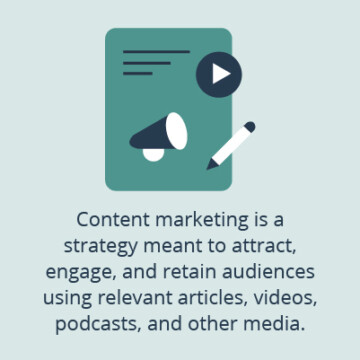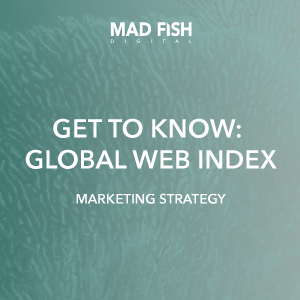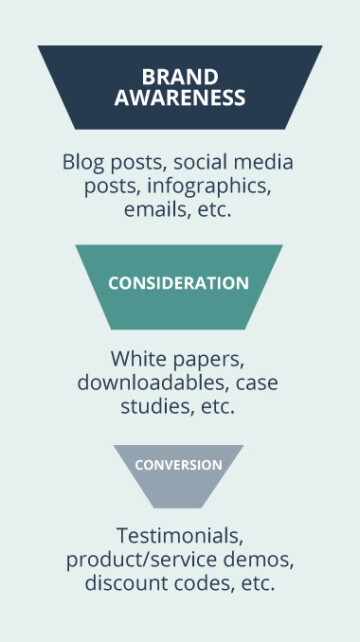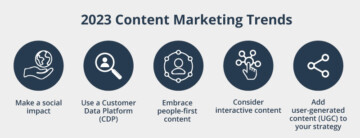Starting your first content strategy can be daunting because each piece must be individualized to your brand. Still, every plan comprises specific foundational elements that simplify content creation, which we use in our work as a digital marketing agency.
Given our expertise in digital content marketing, we want to ensure this guide is helpful for everyone. Let’s briefly answer what content marketing is before heading into the elements every strategy should have.
What is Content Marketing?
Content marketing is a strategy meant to attract, engage, and retain audiences using relevant articles, videos, podcasts, and other media. Think of a content marketing strategy as a set of tactics that address your brand’s pain points using a variety of digital media. Your strategic goals might include the following:
- Increasing traffic or site rankings on search engines.
- Generating leads.
- Increasing brand exposure.
- Demonstrating your expertise within a field.
With those goals in mind, you’ll consider how to achieve your targets with the content you produce yourself or source out to a digital agency. Now, depending on your brand, that media may include:
- SEO content like blogs, landing pages, or other assets
- Social posts on Instagram, TikTok, or elsewhere
- Video content
- Downloadables like guides and white papers
- Visual assets like infographics, checklists, etc.
- Email marketing

A successful content strategy has all or some of those elements and potentially other tactics that help a brand reach its goals. How you use those deliverables and align them with your goals is up to you, but they must include the following elements to stay competitive.
1. Competitor Research
Understanding a brand’s competition is one of the first critical steps of a content marketing strategy. We do this to understand online competitors and to identify opportunities we can use within our strategies. Here’s how to research a competitor:
- Review 3-5 competitors’ websites, social media profiles, and advertising platforms.
- Assess their SEO efforts and perform keyword research.
- Determine their strengths and weaknesses.
- Review your findings and your strategy to uncover opportunities.
2. Measurable Goals and Key Performance Indicators (KPIs)
Every type of content marketing strategy requires goals tailored to your efforts and bandwidth. Meaning, we recommend setting attainable KPIs within a reasonable timeline.
Those KPIs might include the above mentioned goals, like increasing site traffic and conversions, or an entirely different metric you set. Regardless, your objectives need to be measurable at the onset. As a primer, we suggest beginning with the following:
- Increase specific metrics by 10%.
- Reach industry-standard performance.
Remember, if you have trouble setting goals or need advice on tailoring objectives to your brand, we’re always available for a quick chat.
3. Personas and Audience Research
Making a persona means focusing on a member of your target audience and creating a composite. In our content strategies, we use tools like Global Web Index (download details to the right) and other research methods to discover our clients’ ideal customers. That includes performing analysis that surfaces data like:
- Demographic information.
- Behavioral insights.
- Psychographic and attitudinal details.
4. Content Audit
We’ve already discussed the importance of competitive research, so it’s time to analyze your brand’s efforts. Start by revisiting your goals. Then, with those in mind, take inventory of each asset and digital channel. Next, review any available data to see what works and what doesn’t. From there, you’ll move into content planning.

5. Plan Your Content Using the Marketing Funnel
Your content audit should surface opportunities to help you reach your digital marketing goals. Are you overlooking SEO? How about including a variety of content on different platforms?
Addressing common content mistakes discovered in your audit provides primers for planning. From there, you need to use the marketing funnel to understand where your content fits within the buyers’ journey. For example, a basic content marketing funnel might look like this:
Top of Funnel: Brand Awareness
Blog posts, social media posts, infographics, emails, etc.
Middle of Funnel: Consideration
White papers, downloadables, case studies, etc.
Bottom of Funnel: Transactional
Testimonials, product/service demos, discount codes, etc.
6. Strategic Review
The next step is to assess the time and expertise it takes to execute your strategy correctly before the fun begins. In general, your content plan must include:
- Brand goals or KPIs
- Personas
- The customer journey
- List of digital channels and tools
- Content workflow
- Content calendar

7. Execute Your Content Strategy
With a plan in place, it’s time to implement your strategy. And while all of the work you did to get here might feel like you’ve reached the finish line, you’ll spend most of your time executing and staying creative.
We recommend taking a data-driven approach that allows your brand to refine and build reach through what’s worked in the past. We also suggest sticking to a regular schedule or leveraging digital tools that keeps things on course, whether that’s by publishing a monthly or organizing social media content that’s posted at the same time and day of the week.
8. Reporting and Analysis
Some brands may need reminders on the importance of reporting and data analysis after executing a strategy. Remember to set monthly reminders to review content performance on specific platforms, Google Analytics, or your own marketing dashboard to understand what works best.
2023 Content Marketing Trends
We love what we do because it allows us to stay innovative across evolving industries. To set yourself apart from your competition with your new content strategy, here are five content marketing trends that will dominate in 2023:
- Make a social impact
- Use a Customer Data Platform (CDP)
- Embrace people-first content
- Consider interactive content
- Add user-generated content (UGC) to your strategy
Read 5 Content Marketing Trends Set to Dominate 2023 to learn more.
Your Content Marketing Agency in Portland
We build results-oriented content strategies that engage through words, visuals, and video. It’s a tremendous amount of work, and having every detail accounted for within a plan at the onset is the best path for success, but we understand the challenges of building a successful content strategy.
Should you need additional advice, an agency partner, or someone to discuss your current plans, we’re always available to chat.


